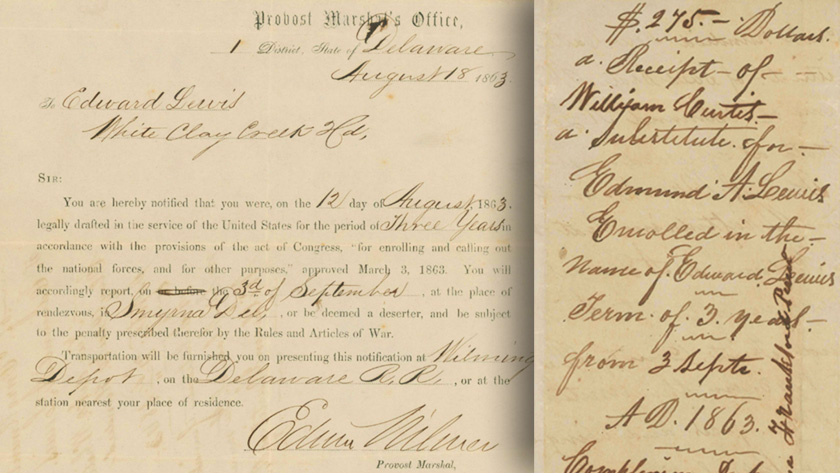
The Civil War Experience for an Affluent Family: The Lewis Family Papers
By David Cardillo, Digital Initiatives and Preservation
Special Collections houses the Lewis Family Papers, which include materials from multiple generations of the prominent Newark family that span from 1696 to 1915. Members of the family were farmers and landholders, eventually acquiring wealth and owning property along what is now Academy Street.
The Lewis Family Papers provide a firsthand accounting of the history of Newark from the mid-19th century through the early 20th century. Within the papers, there are maps, ledgers, indentures, poems, receipts, account books, legal documents, correspondence, photographs, news clippings and more.
One topic of note within the papers is the Civil War. Among the documents in this collection, there is a draft notice – dated August 1863 – for Edmund Armitage Lewis to serve a term of duty in the Civil War.
Rather than send his son to war, Albert Gallatin Lewis paid farmer William Curtis $275 to go in place of Edmund Armitage Lewis. The contract that was drawn up for this agreement and the receipt for payment are both found in the family papers.
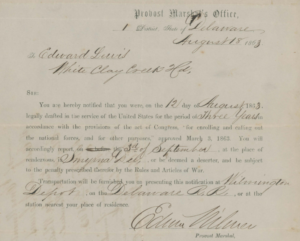 Draft notice for Edmund Armitage Lewis. Click to expand. |
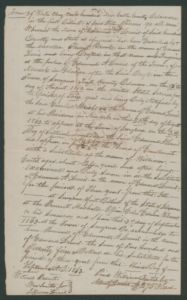 Substitute agreement drawn up by the father of Edmund Armitage Lewis, Albert Gallatin Lewis. Click to expand. |
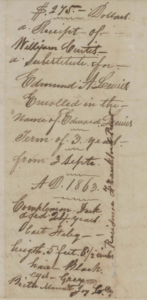 Receipt of money paid to William Curtis to take the place of Edmund Armitage Lewis. Click to expand. |
In the receipt, there is a description of William Curtis. During this time, there were no formal, standardized identification practices, and photographs were still expensive and lengthy processes. A third party, George L. Rankin, was brought in to provide written descriptions of the people involved, which included Edmund Armitage Lewis and William Curtis.
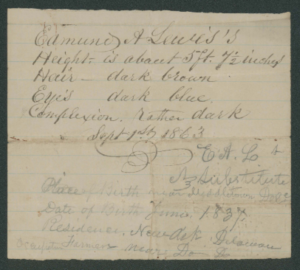 Description of Edmund Armitage Lewis by George L. Rankin. Click to expand. |
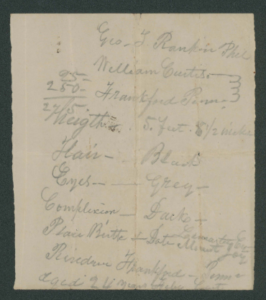 Description of William Curtis by George L. Rankin. Click to expand. |
Interestingly, the United States Army was perfectly okay with all this as evidenced by the letter in the Lewis family papers that exempts Edmund Armitage Lewis from military service.
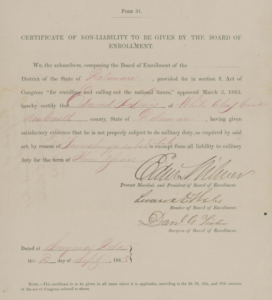
Letter from the United States Army, accepting the substitution of William Curtis for Edmund Armitage Lewis and excusing Lewis from military service. Click to expand.
While substitutions were common during the Civil War, most draftees couldn’t afford to do so. It is unknown whether William Curtis survived his enlistment and went back to farming or if he was killed in action during the war.
The Lewis Family Papers consist of materials that document multiple generations of the family, spanning from 1696 to 1915. The bulk of the material is from 1791 to 1874. The papers are made freely and digitally accessible through the Library, Museums and Press. Members of the Delaware-based family were farmers and landowners who maintained business relations with many prominent citizens of early Newark. As a result, researchers interested in domestic and business issues of the time as well as local and national trends in education, politics and land dealings may find these resources especially useful.
